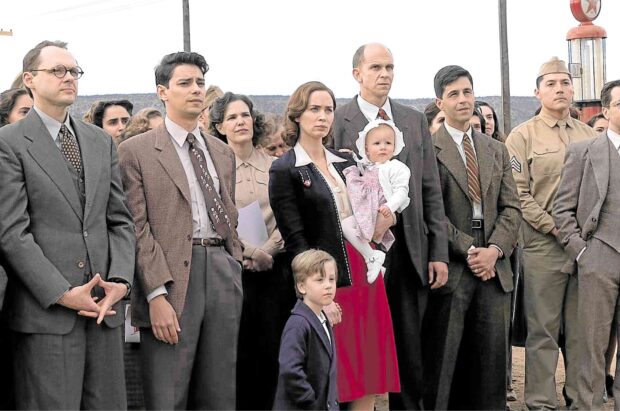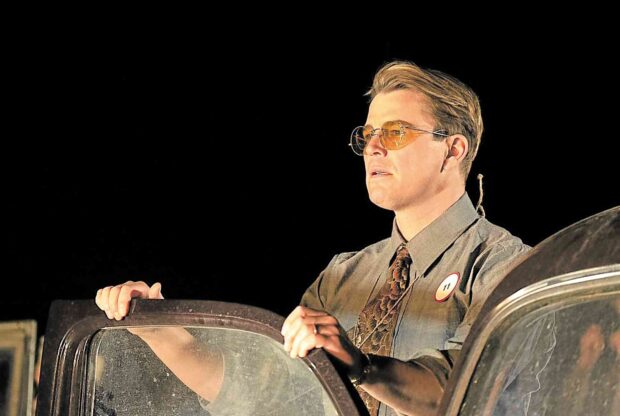
Emily Blunt
Roughly 220,000 people were killed in the atomic bombings of Hiroshima and Nagasaki in 1945. Almost 80 years later, that heart-crushing massacre remains to be the only use of nuclear weapons in an armed conflict.
Acknowledging the deadly repercussions of his mind-blowing feat, J. Robert Oppenheimer, the so-called “father of the atomic bomb,” opposed further development of the hydrogen bomb and lobbied for international control of nuclear power.
Sadly, no amount of preventive or reparative actions thereafter could bring back the innocent lives who perished in the bombings.
In the riveting three-hour film “Oppenheimer,” director Christopher Nolan plumbs deep into the heart and conscience of the man behind the enigmatic genius, imbued with so much gravitas by Cillian Murphy. More than that, it provides indispensable context required to comprehend significant moments in history.
Like Nolan’s other thematically alluring and visually spectacular productions, the film defies expectations as it leaves viewers fully immersed in its intense narrative and mulling over their own concepts of right and wrong.
Another strong driver of the story is how Oppenheimer deals with his relationships with the people around him—including supporter-turned-nemesis Lewis Strauss (the award-worthy Robert Downey Jr.), Leslie Groves (Matt Damon), Ernest Lawrence (Josh Hartnett), Niels Bohr (Kenneth Branagh), Vannebar Bush (Matthew Modine), Albert Einstein (Tom Conti), Edward Teller (Benny Safdie), David Hill (Rami Malek), Harry Truman (Gary Oldman), Oppenheimer’s wife Kitty (Emily Blunt) and his mistress Jean Tatlock (Florence Pugh).
As a result, it delivers a coruscating feast of intricate storytelling, framed by exceptional production elements that are best appreciated and savored on the big screen—and, yes, preferably on Imax.

Josh Hartnett
Learn about life
We won’t lie. The film’s bum-numbing length will prove a challenge to viewers with attention-deficit issues, but the payoff is worth more than the price of patience. Such is the power of Nolan’s storytelling gifts.
In a recent Q&A with Cillian, the 47-year-old Irish actor admitted that while headlining the film was a dream come true for him, he believes that the movie should be essential viewing for people who want to take their films seriously—not everything is about spectacular escapist fare or score-settling explosions.
He explained, “What’s extra special about this movie is that it’s talking about the world. It really digs up what it means to be human, our responsibility as humans on this planet, and what we do with the power that we can harness—which in this case is this extraordinary weapon [of mass destruction].
“I think it was Truffaut who said that we go to films not only to escape from life, but also to learn about life. And I believe ‘Oppenheimer’ is one of those great movies that is incredibly entertaining, but also makes you think.
“There’s a universality to it that people connect to. There are big questions being asked of the audience, and no answers are being given—which always lends to excellent filmmaking.
“But ‘Oppenheimer’ is also a thriller and a love story, with elements of horror in there as well. So, all of that can resonate with an audience. And the period setting, however familiar or not you may be with what happened in 1945, will wrap you up in it too.
“This movie grabs you by the throat from the beginning, and you just don’t take a breath from start to finish. We are now living in a nuclear age because of what happened then. I mean, it changed the world, and we’ve been living with the fallout of that event ever since.”
Cillian Murphy (right) with Matt Damon
Another aspect that makes “Oppenheimer” a must-see is the fact that, while Nolan’s films often take deep dives into their dark and disquieting themes and existentialist elements, they’ve nevertheless been met with eager fan anticipation despite its director’s refusal to take the “formulaic blockbuster” approach to storytelling.
In fact, nobody said that Nolan’s films, like “Tenet,” “Dunkirk,” “Interstellar,” “Inception” and “The Dark Knight” trilogy, were easy to watch, and yet, they have so far earned more than $5 billion at the global box office. They’ve even been awarded 11 Oscars and 36 nominations, including two Best Picture nods.
From the get-go, the movie isn’t shy about the cautionary nature of its subject matter and begins by referencing a cautionary tale from Greek mythology: “Prometheus stole fire from the gods and gave it to man.”
Indeed, what does man do when he’s given considerable power? Look around you and you’ll see a lot of frustrating answers staring in your face.
In Nolan’s case, he wanted to understand the dynamics surrounding the dilemma facing the brilliant man behind the invention that represented the “sum total of human ingenuity”—an invention that would remake civilization, even as its very existence threatened the future of mankind.
Robert Downey Jr.
‘Must be seen to be believed’
Inspired by Kai Bird and Martin J. Sherwin’s Pulitzer Prize-winning book “American Prometheus,” the 52-year-old director wanted to “refresh” people’s memories about a story that “must be seen to be believed.”
“What I wanted to do was take the audience into the mind and experience of a person who sat at the absolute center of the largest shift in history,” said Nolan in a separate Q&A. “Like it or not, J. Robert Oppenheimer is the most important person who ever lived. He made the world we live in, for better or for worse.”
And therein lies the rub. In Oppenheimer’s case, it’s the conundrum that was as much a scientific as it was a moral issue: While the making of the atomic bomb was a triumph of human ingenuity that led to innovations in science and technology, it also commenced an arms race that has had seismic and destructive ramifications for the entire world. It introduced a new existential fear into the lives of people everywhere. “In the run-up to the Trinity test, Oppenheimer and his team were dealing with the very small possibility that when they pushed that button and triggered that first bomb, they would set fire to the atmosphere and destroy the entire planet,” Nolan noted. “There was no mathematical or theoretical basis on which they could completely rule out that possibility, however small. And yet, they pushed that button anyway.
“It’s an extraordinary moment in human history. I wanted to take the audience into that room and be there for that conversation, and then be there also when that button is pushed. It’s just the most incredible moment, if you think about it—the risk of it!
“The relationship between science, theory, intellect—the things that we can imagine—versus the practical nature of bringing these abstract ideas into the real world, dealing with them as concrete realities, and all their consequences.
“Oppenheimer’s story is full of paradoxes and ethical dilemmas, and that’s the kind of material I’m always interested in. While the movie tries to help the audience understand why people have done the things they’ve done, it’s at the same time asking if they should have done the things they did.
“And film, as a narrative medium, is uniquely suited to pulling an audience into a subjective experience, letting them judge things the way the characters judge them, while at the same time looking at these characters a little more objectively.
“At various points, we try to burrow into Oppenheimer’s psyche and take the audience on his emotional journey. That was the challenge of the film: To tell the story of a person who was involved in what was ultimately an extraordinarily destructive sequence of events, but done for the right reasons. And we tell this tale from his point of view.”

